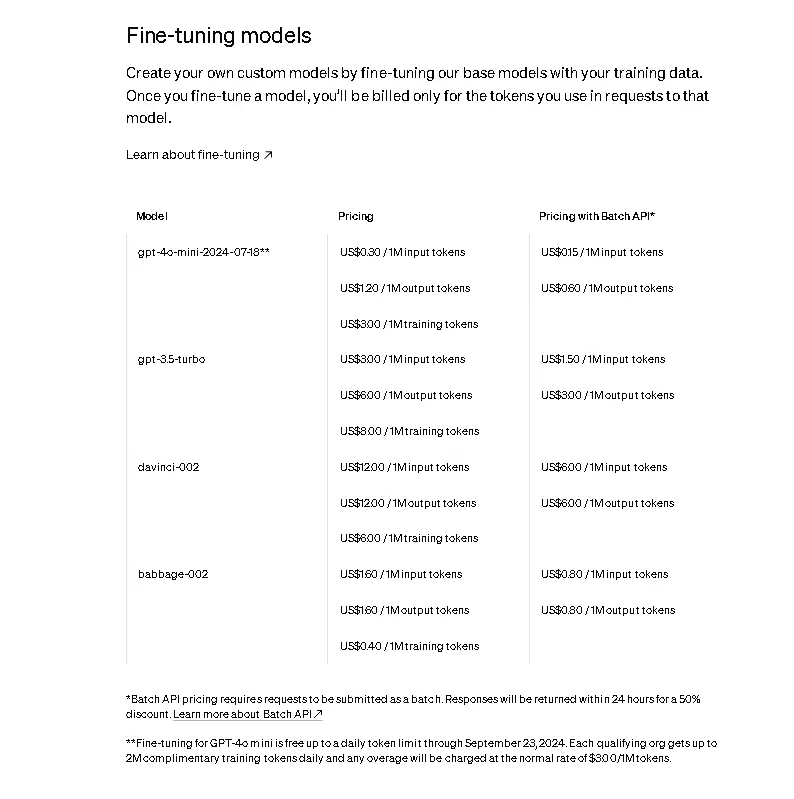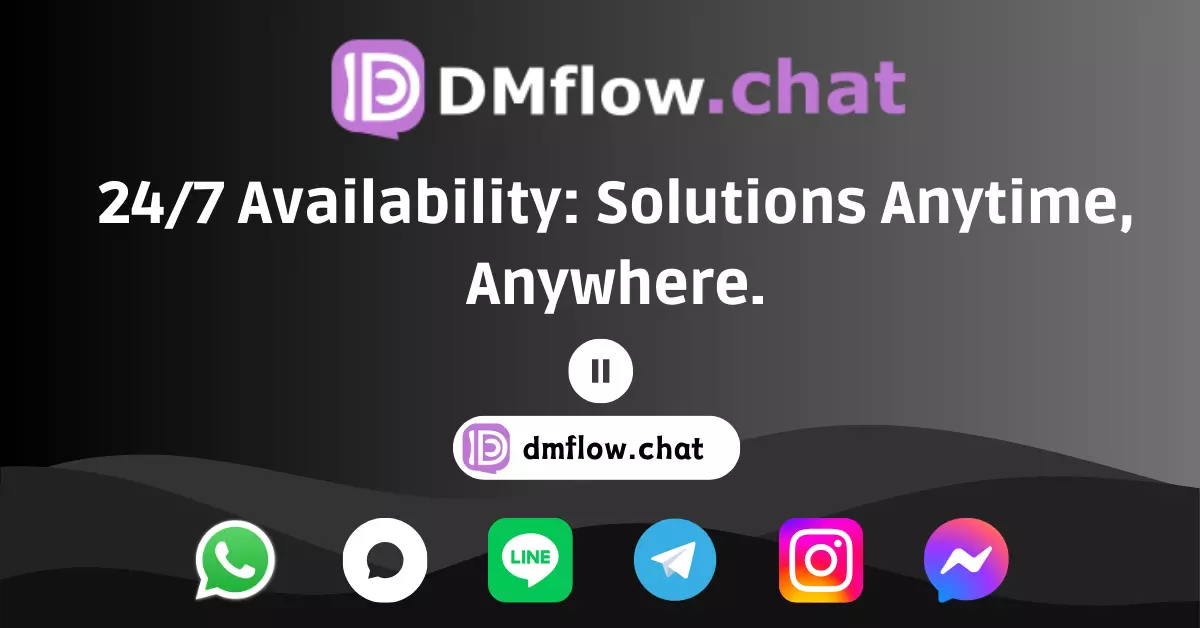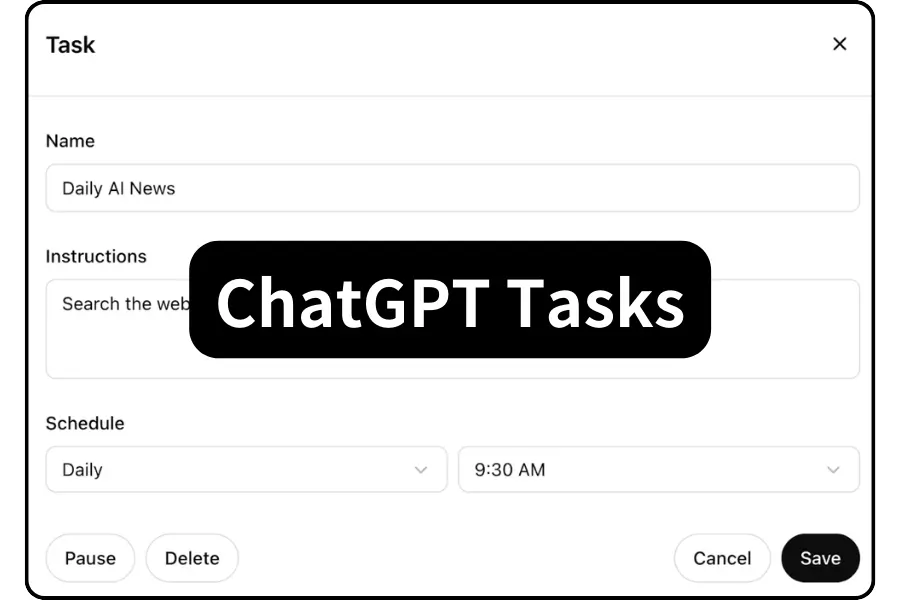OpenAI Offers Limited-Time Free Fine-Tuning Service for GPT-4o Mini Model
OpenAI is currently offering a limited-time free fine-tuning service for its GPT-4o Mini model. Importantly, this offer is only available until September 23, 2024. This service is initially open only to users at OpenAI’s fourth and fifth usage tiers, which are the most expensive tiers in OpenAI’s plans. The company plans to gradually expand access to free fine-tuning during this promotional period, eventually making it available to users of all tiers.
Free Fine-Tuning Limitations and Costs
During this limited-time offer:
- Each organization can receive 2 million training tokens every 24 hours to train the model.
- Additional tokens will be charged at $3.00 per million tokens.
- These terms may change after September 23, 2024.
More detailed information on fine-tuning can be found in OpenAI’s fine-tuning documentation.
How to Start Using the Limited-Time Free Fine-Tuning
Developers can begin free fine-tuning of GPT-4o Mini by following these steps before September 23, 2024:
- Visit their fine-tuning dashboard
- Click “Create”
- Select “GPT-4o Mini” from the base model dropdown menu
Advantages of GPT-4o Mini
Compared to OpenAI’s GPT-3.5 Turbo, GPT-4o Mini offers the following advantages:
- Higher cost efficiency
- Enhanced capabilities
- Longer context understanding
- Lower latency
Released on July 18, 2024, GPT-4o Mini aims to broaden AI application by reducing AI usage costs.
Applications of GPT-4o Mini
This model can support a variety of tasks, including:
- Applications that link or parallelize model calls
- Providing large amounts of contextual information to the model
- Interacting with customers through fast real-time text responses, such as customer support chatbots
Significance and Benefits of Fine-Tuning
Fine-tuning is like a dedicated training camp for AI models, making them more attuned to our needs and better at handling specific tasks. Key concepts of fine-tuning include reproducibility, specialization, and efficiency improvement.
The main benefits of fine-tuning are:
- More precise responses
- Higher cost efficiency
- More unique AI assistants
Suitable Scenarios for Fine-Tuning
Fine-tuning is particularly suitable for:
- Requiring the AI to write in a specific tone or style
- Expecting the AI to handle deep knowledge in a particular professional field
- Demanding the AI to execute complex multi-step tasks
- Needing extensive AI translation with specific writing style and format
Key Steps for Implementing Fine-Tuning
- Prepare high-quality training data
- Choose the appropriate base model
- Set suitable learning parameters
- Continuously evaluate and optimize
Considerations
- Fine-tuning requires certain technical knowledge and computational resources
- Over-tuning can lead to model “overfitting”
- Pay attention to data privacy and copyright issues
- Remember, this free fine-tuning service is only available until September 23, 2024
Fine-tuning brings innovative AI application possibilities to various industries, whether it’s an assistant that better understands industry jargon or an AI capable of executing complex workflows accurately. Users interested in this service are encouraged to try it out during the promotional period and make full use of it.
Fine-Tuning Pricing

Conclusion
The limited-time free fine-tuning service for the GPT-4o Mini model provided by OpenAI is undoubtedly a major opportunity in the field of AI development. It not only offers developers and enterprises a valuable chance to optimize their AI applications but also has the potential to drive the entire industry forward.
This offer reflects OpenAI’s commitment to making AI technology more accessible and practical. By lowering the entry barrier, OpenAI encourages more people to participate in AI innovation, which may lead to a new wave of more personalized and specialized AI applications.
However, time is limited, and the deadline of September 23, 2024, means that interested users need to act quickly. Whether looking to improve the performance of existing AI systems or planning to develop new AI applications, now is the best time.
Overall, this service is not just a technical opportunity but an invitation to explore the potential of AI. It showcases the future of AI: more flexible, more professional, and more closely aligned with the specific needs of each field. For visionary developers and enterprises, this is an unmissable chance to gain an edge in the AI revolution.





